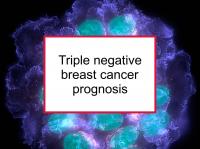The influence of metabolic syndrome, body weight, and diabetes on triple negative (ER-/PR-/HER2-) breast cancer prognosis is not straightforward. Metabolic syndrome is characterized by obesity, high blood sugar levels, impaired glucose tolerance, high blood cholesterol and triglycerides, and high blood pressure.
Type 2 diabetes is associated with more advanced stage at diagnosis and shortened survival among breast cancer patients.
Metabolic syndrome and risk of triple negative breast cancer
Metabolic syndrome is associated with increased risk of triple negative breast cancer. However, when the symptoms of the syndrome were examined separately, high triglyceride, HDL cholesterol, and glucose levels, but not hypertension or high body mass index (BMI), were found to have significant independent associations with triple negative breast cancer risk in one study. Another study found that high cholesterol induced angiogenesis and accelerated mammary tumor growth in a mouse model of triple negative breast cancer.
Metabolic syndrome and prognosis of triple negative breast cancer
One 2021 study concerning the influence of metabolic syndrome among women with triple negative breast cancer reported that hypertension was significantly associated with worse risk of recurrence and breast cancer-specific mortality. The same study found that high BMI (≥ 30 kg/m2) was associated with worse survival among patients over 65.
Another 2021 study reported that women with early stage triple negative breast cancer with three or four of the following characteristics: (1) waist circumference of at least 35 inches; (2) high blood pressure; (3) high cholesterol; and (4) type 2 diabetes had worse survival than those with only one or two.
Obesity and prognosis of triple negative breast cancer
The findings above contradict some previous studies that concluded that higher BMI at diagnosis was not associated with higher breast cancer recurrence and mortality among women with estrogen receptor negative (ER-) or triple negative disease.
In fact, while obesity might not be a strong risk factor for the development of triple negative breast cancer, there is ample evidence that weight influences outcomes in some circumstances. A 2025 study reported that obesity may accelerate the progression of triple negative breast cancer through increased proinflammatory and unfavorable immune conditions in the tumor microenvironment.
Having been overweight at age 18 has been found to be associated with increased risk of death among women who subsequently developed ER- breast cancer. A Chinese study reported that BMI ≥ 25 was associated with lower rates of pathological complete response response to paclitaxel chemotherapy in women with ER-/PR- disease. Severe obesity (defined as BMI > 35) appears to be linked with increased risk of late relapse (breast cancer recurrence five years or more after diagnosis). One study found that survival was reduced among very obese (BMI ≥ 40) women with triple negative disease, but not among women who were overweight or less obese.
Type 2 diabetes & Metformin
Diabetic women taking metformin have been shown to have lower risk of breast cancer, however there is some evidence that using metformin could increase the likelihood that any breast cancer that does develop is triple negative. Use of metformin has been shown to reduce triple negative breast cancer angiogenesis, growth and metastasis and is associated with reduced breast cancer mortality.
Additional triple negative breast cancer articles
Below are links to other some articles concerning triple negative breast cancer.
